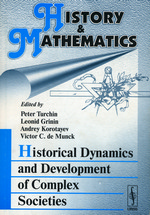
|
History & Mathematics:Historical Dynamics and Development of Complex SocietiesMoscow: KomKniga, 2006. – 216 p.
Edited by Peter Turchin, Leonid Grinin, Victor C. de Munck, and Andrey Korotayev
ISBN 5-484-01002-0 Editorial Council:
Leonid Borodkin (Moscow State University), Dmitry Chernavsky (Russian Academy of Sciences), Leonid Grinin (Volgograd Center for Social Research), Andrey Korotayev (Russian State University for the Humanities), Alexander Logunov (Russian State University for the Humanities), Gregory Malinetsky (Russian Academy of Sciences), Sergey Malkov (Russian Academy of Military Sciences), Peter Turchin (University of Connecticut)
|
The times of "Pure History" when historians were only interested in the deeds of kings and heroes passed long ago. A more and more important role is played by new directions in historical research that study long-term dynamic processes and quantitative changes. This kind of history can hardly develop without the application of mathematical methods.
This almanac continues a series of edited volumes dedicated to various aspects of the application of mathematical methods to the study of history and society. This edited volume considers historical dynamics and development of complex societies. Its constituent articles treat historical processes at very different levels of scale. Some articles study global dynamics during the last millennia covering the formation and development of the World System. Other articles focus on the dynamics of single societies, or even communities. In general, this issue of the almanac constitutes an integrated study of a number of important historical processes through the application of various mathematical methods. In particular, these articles trace the trajectories of political development from the early states to mature statehood. This almanac also traces trajectories of urban development, and important demographic, technological, and sociostructural changes.
The almanac demonstrates that the application of mathematical methods not only facilitates the processing of historical information, but can also give to a historian a deeper understanding of historical processes.
Contents
Contents
Introduction. Why Do We Need Mathematical Models of Historical Processes (by Peter Turchin, Andrey Korotayev, and Leonid Grinin)
| Peter Turchin | Scientific Prediction in Historical Sociology: Ibn Khaldun meets Al Saud |
| Jürgen Klüver | Logical and Explanative Characteristics of Evolutionary Theories |
| Andrey Korotayev | The World System Urbanization Dynamics: A quantitative analysis |
| Leonid Grinin,
Andrey Korotayev | Political Development of the World System: A formal quantitative analysis |
| Andrey Korotayev,
Leonid Grinin | Urbanization and Political Development of the World System: A comparative quantitative analysis |
| Victor C. de Munck | Experiencing History Small: An analysis of political, economic and social change in a Sri Lankan village |
| Charles S. Spencer | Modeling (and Measuring) Expansionism and Resistance: State formation in Ancient Oaxaca, Mexico |
| Artemy Malkov | The Silk Roads: A mathematical model |
List of contributors
hide





